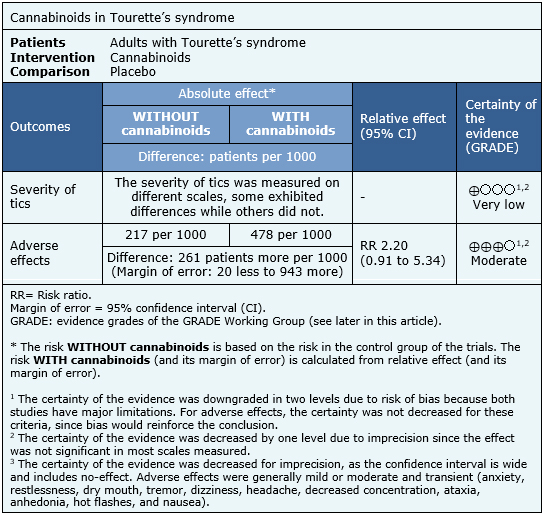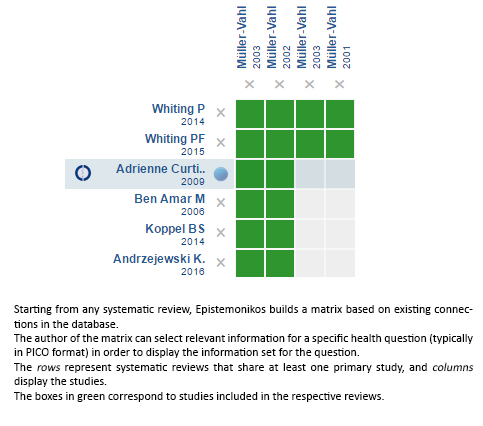 Para Descargar PDF debe Abrir sesión.
Para Descargar PDF debe Abrir sesión.
It has been suggested that the use of cannabinoids might play a role in the treatment of Tourette’s syndrome, but there is no consensus. Searching in Epistemonikos database, which is maintained by screening multiple databases, we identified seven systematic reviews including two randomized trials addressing the question of this article. We extracted data, combined the evidence using meta-analysis and generated a summary of findings following the GRADE approach. We concluded it is not clear whether cannabinoids reduce tics in Tourette’s syndrome, and they are probably associated to frequent adverse effects.
Tourette's syndrome is a neuropsychiatric disorder characterized by the presence of involuntary movements (motor tics) and vocalizations (vocal tics). In this condition, there is a lack of inhibition of neuronal cortico-striatal-thalamic-cortical circuits. Many drugs have been tried in order to reduce tics, with responses not entirely satisfactory. In the search for new therapies, the use of cannabinoids has been put forward, but there is no clear consensus about their clinical role.
We used Epistemonikos database, which is maintained by screening multiple databases, to identify systematic reviews and their included primary studies. With this information, we generated a structured summary using a pre-established format, which includes key messages, a summary of the body of evidence (presented as an evidence matrix in Epistemonikos), meta-analysis of the total of studies, a summary of findings table following the GRADE approach and a table of other considerations for decision-making.
|
Key messages
|
|
What is the evidence. |
We found seven systematic reviews [1],[2],[3],[4],[5],[6],[7] including two randomized controlled trials reported in four references [8],[9],[10],[11]. |
|
What types of patients were included |
Both trials enrolled men and women diagnosed with Tourette’s syndrome based on DSM III criteria. |
|
What types of interventions were included |
Both trials evaluated the use of tetrahydrocannabinol capsules administered orally. In one trial, the dose was 5 mg, 7.5 mg or 10 mg once [9], and in the other trial, the dose was not specified [8]. Both trials compared against placebo. |
|
What types of outcomes |
The systematic reviews assessed the following outcomes:
|
* TSSL = Tourette's syndrome symptoms list; STSSS = Shapiro Tourette syndrome severity scale; YGTSS = Yale Global Tic Severity Scale; TSGS = Tourette's syndrome global scale; TSC-GI = Tourette's syndrome clinical global impression scale
Both trials evaluated the use of tetrahydrocannabinol capsules administered orally. In one trial, the dose was 5 mg, 7.5 mg or 10 mg once [9], and in the other trials, the dose was not specified [8].
The Information on the effects of cannabinoids for Tourette’s syndrome is based on two randomized trials including 28 patients in total [8], [9]. Both trials measured the severity of tics, using different scales. The summary of findings is as follows:


|
To whom this evidence does and does not apply |
|
| About the outcomes included in this summary |
|
| Balance between benefits and risks, and certainty of the evidence |
|
| What would patients and their doctors think about this intervention |
|
| Resource considerations |
|
|
Differences between this summary and other sources |
|
| Could this evidence change in the future? |
|
Using automated and collaborative means, we compiled all the relevant evidence for the question of interest and we present it as a matrix of evidence.

Follow the link to access the interactive version: Cannabinoids for Tourette's syndrome
The upper portion of the matrix of evidence will display a warning of “new evidence” if new systematic reviews are published after the publication of this summary. Even though the project considers the periodical update of these summaries, users are invited to comment in Medwave or to contact the authors through email if they find new evidence and the summary should be updated earlier. After creating an account in Epistemonikos, users will be able to save the matrixes and to receive automated notifications any time new evidence potentially relevant for the question appears.
The details about the methods used to produce these summaries are described here http://dx.doi.org/10.5867/medwave.2014.06.5997.
Epistemonikos foundation is a non-for-profit organization aiming to bring information closer to health decision-makers with technology. Its main development is Epistemonikos database (www.epistemonikos.org).
These summaries follow a rigorous process of internal peer review.
Conflicts of interest
The authors do not have relevant interests to declare.
 Esta obra de Medwave está bajo una licencia Creative Commons Atribución-NoComercial 3.0 Unported. Esta licencia permite el uso, distribución y reproducción del artículo en cualquier medio, siempre y cuando se otorgue el crédito correspondiente al autor del artículo y al medio en que se publica, en este caso, Medwave.
Esta obra de Medwave está bajo una licencia Creative Commons Atribución-NoComercial 3.0 Unported. Esta licencia permite el uso, distribución y reproducción del artículo en cualquier medio, siempre y cuando se otorgue el crédito correspondiente al autor del artículo y al medio en que se publica, en este caso, Medwave.

It has been suggested that the use of cannabinoids might play a role in the treatment of Tourette’s syndrome, but there is no consensus. Searching in Epistemonikos database, which is maintained by screening multiple databases, we identified seven systematic reviews including two randomized trials addressing the question of this article. We extracted data, combined the evidence using meta-analysis and generated a summary of findings following the GRADE approach. We concluded it is not clear whether cannabinoids reduce tics in Tourette’s syndrome, and they are probably associated to frequent adverse effects.
 Autores:
Karen García[1,2], Gabriel Rada[2,3,4,5,6]
Autores:
Karen García[1,2], Gabriel Rada[2,3,4,5,6]

Citación: García K, Rada G. Do cannabinoids have a role to play in Tourette’s syndrome?. Medwave 2016;16(Suppl5):e6793 doi: 10.5867/medwave.2016.6793
Fecha de publicación: 9/12/2016

Nos complace que usted tenga interés en comentar uno de nuestros artículos. Su comentario será publicado inmediatamente. No obstante, Medwave se reserva el derecho a eliminarlo posteriormente si la dirección editorial considera que su comentario es: ofensivo en algún sentido, irrelevante, trivial, contiene errores de lenguaje, contiene arengas políticas, obedece a fines comerciales, contiene datos de alguna persona en particular, o sugiere cambios en el manejo de pacientes que no hayan sido publicados previamente en alguna revista con revisión por pares.
Aún no hay comentarios en este artículo.
Para comentar debe iniciar sesión
 Medwave publica las vistas HTML y descargas PDF por artículo, junto con otras métricas de redes sociales.
Medwave publica las vistas HTML y descargas PDF por artículo, junto con otras métricas de redes sociales.
 Curtis A, Clarke CE, Rickards HE. Cannabinoids for Tourette's Syndrome. Cochrane Database Syst Rev. 2009 Oct 7;(4):CD006565 | CrossRef | PubMed |
Curtis A, Clarke CE, Rickards HE. Cannabinoids for Tourette's Syndrome. Cochrane Database Syst Rev. 2009 Oct 7;(4):CD006565 | CrossRef | PubMed | Ben Amar M. Cannabinoids in medicine: A review of their therapeutic potential.J Ethnopharmacol. 2006 Apr 21;105(1-2):1-25 | CrossRef | PubMed |
Ben Amar M. Cannabinoids in medicine: A review of their therapeutic potential.J Ethnopharmacol. 2006 Apr 21;105(1-2):1-25 | CrossRef | PubMed | Koppel BS, Brust JC, Fife T, Bronstein J, Youssof S, Gronseth G, et al. Systematic review: efficacy and safety of medical marijuana in selected neurologic disorders: report of the Guideline Development Subcommittee of the American Academy of Neurology. Neurology. 2014 Apr 29;82(17):1556-63 | CrossRef | PubMed |
Koppel BS, Brust JC, Fife T, Bronstein J, Youssof S, Gronseth G, et al. Systematic review: efficacy and safety of medical marijuana in selected neurologic disorders: report of the Guideline Development Subcommittee of the American Academy of Neurology. Neurology. 2014 Apr 29;82(17):1556-63 | CrossRef | PubMed | Waldon K, Hill J, Termine C, Balottin U, Cavanna AE. Trials of pharmacological interventions for Tourette syndrome: a systematic review. Behav Neurol. 2013;26(4):265-73 | CrossRef | PubMed |
Waldon K, Hill J, Termine C, Balottin U, Cavanna AE. Trials of pharmacological interventions for Tourette syndrome: a systematic review. Behav Neurol. 2013;26(4):265-73 | CrossRef | PubMed | Whiting P, Wolff R, Westwood M, Duffy S, Misso K, Keurentjes C, et al. Systematic review of cannabis for medical use. Kleijnen Systematic Reviews Ltd. 2014 | Link |
Whiting P, Wolff R, Westwood M, Duffy S, Misso K, Keurentjes C, et al. Systematic review of cannabis for medical use. Kleijnen Systematic Reviews Ltd. 2014 | Link | Whiting PF, Wolff RF, Deshpande S, Di Nisio M, Duffy S, Hernandez AV, et al. Cannabinoids for Medical Use: A Systematic Review and Meta-analysis. JAMA. 2015 Jun 23-30;313(24):2456-73 | CrossRef | PubMed |
Whiting PF, Wolff RF, Deshpande S, Di Nisio M, Duffy S, Hernandez AV, et al. Cannabinoids for Medical Use: A Systematic Review and Meta-analysis. JAMA. 2015 Jun 23-30;313(24):2456-73 | CrossRef | PubMed | Andrzejewski K, Barbano R, Mink J. Cannabinoids in the treatment of movement disorders: A systematic review of case series and clinical trials. Basal Ganglia. 2016;6(3):173-181 | CrossRef |
Andrzejewski K, Barbano R, Mink J. Cannabinoids in the treatment of movement disorders: A systematic review of case series and clinical trials. Basal Ganglia. 2016;6(3):173-181 | CrossRef | Müller-Vahl KR, Koblenz A, Jöbges M, Kolbe H, Emrich HM, Schneider U. Influence of treatment of Tourette syndrome with delta9-tetrahydrocannabinol (delta9-THC) on neuropsychological performance. Pharmacopsychiatry. 2001 Jan;34(1):19-24 | PubMed |
Müller-Vahl KR, Koblenz A, Jöbges M, Kolbe H, Emrich HM, Schneider U. Influence of treatment of Tourette syndrome with delta9-tetrahydrocannabinol (delta9-THC) on neuropsychological performance. Pharmacopsychiatry. 2001 Jan;34(1):19-24 | PubMed | Müller-Vahl KR, Prevedel H, Theloe K, Kolbe H, Emrich HM, Schneider U. Treatment of Tourette syndrome with delta-9-tetrahydrocannabinol (delta 9-THC):no influence on neuropsychological performance. Neuropsychopharmacology. 2003 Feb;28(2):384-8 | PubMed |
Müller-Vahl KR, Prevedel H, Theloe K, Kolbe H, Emrich HM, Schneider U. Treatment of Tourette syndrome with delta-9-tetrahydrocannabinol (delta 9-THC):no influence on neuropsychological performance. Neuropsychopharmacology. 2003 Feb;28(2):384-8 | PubMed | Müller-Vahl KR, Schneider U, Koblenz A, Jöbges M, Kolbe H, Daldrup T, et al. Treatment of Tourette's syndrome with Delta 9-tetrahydrocannabinol (THC): a randomized crossover trial. Pharmacopsychiatry. 2002 Mar;35(2):57-61 | PubMed |
Müller-Vahl KR, Schneider U, Koblenz A, Jöbges M, Kolbe H, Daldrup T, et al. Treatment of Tourette's syndrome with Delta 9-tetrahydrocannabinol (THC): a randomized crossover trial. Pharmacopsychiatry. 2002 Mar;35(2):57-61 | PubMed | Müller-Vahl KR, Schneider U, Prevedel H, Theloe K, Kolbe H, Daldrup T, et al. Delta 9-tetrahydrocannabinol (THC) is effective in the treatment of tics in Tourette syndrome: a 6-week randomized trial. J Clin Psychiatry. 2003 Apr;64(4):459-65 | PubMed |
Müller-Vahl KR, Schneider U, Prevedel H, Theloe K, Kolbe H, Daldrup T, et al. Delta 9-tetrahydrocannabinol (THC) is effective in the treatment of tics in Tourette syndrome: a 6-week randomized trial. J Clin Psychiatry. 2003 Apr;64(4):459-65 | PubMed | Roessner V, Plessen KJ, Rothenberger A, Ludolph AG, Rizzo R, Skov L, et al. European clinical guidelines for Tourette syndrome and other tic disorders. Part II: pharmacological treatment. Eur Child Adolesc Psychiatry. 2011 Apr;20(4):173-96 | CrossRef | PubMed |
Roessner V, Plessen KJ, Rothenberger A, Ludolph AG, Rizzo R, Skov L, et al. European clinical guidelines for Tourette syndrome and other tic disorders. Part II: pharmacological treatment. Eur Child Adolesc Psychiatry. 2011 Apr;20(4):173-96 | CrossRef | PubMed | Pringsheim T, Doja A, Gorman D, McKinlay D, Day L, Billinghurst L, et al. Canadian guidelines for theevidence-based treatment of tic disorders: pharmacotherapy. Can J Psychiatry. 2012 Mar;57(3):133-43 | PubMed |
Pringsheim T, Doja A, Gorman D, McKinlay D, Day L, Billinghurst L, et al. Canadian guidelines for theevidence-based treatment of tic disorders: pharmacotherapy. Can J Psychiatry. 2012 Mar;57(3):133-43 | PubMed |